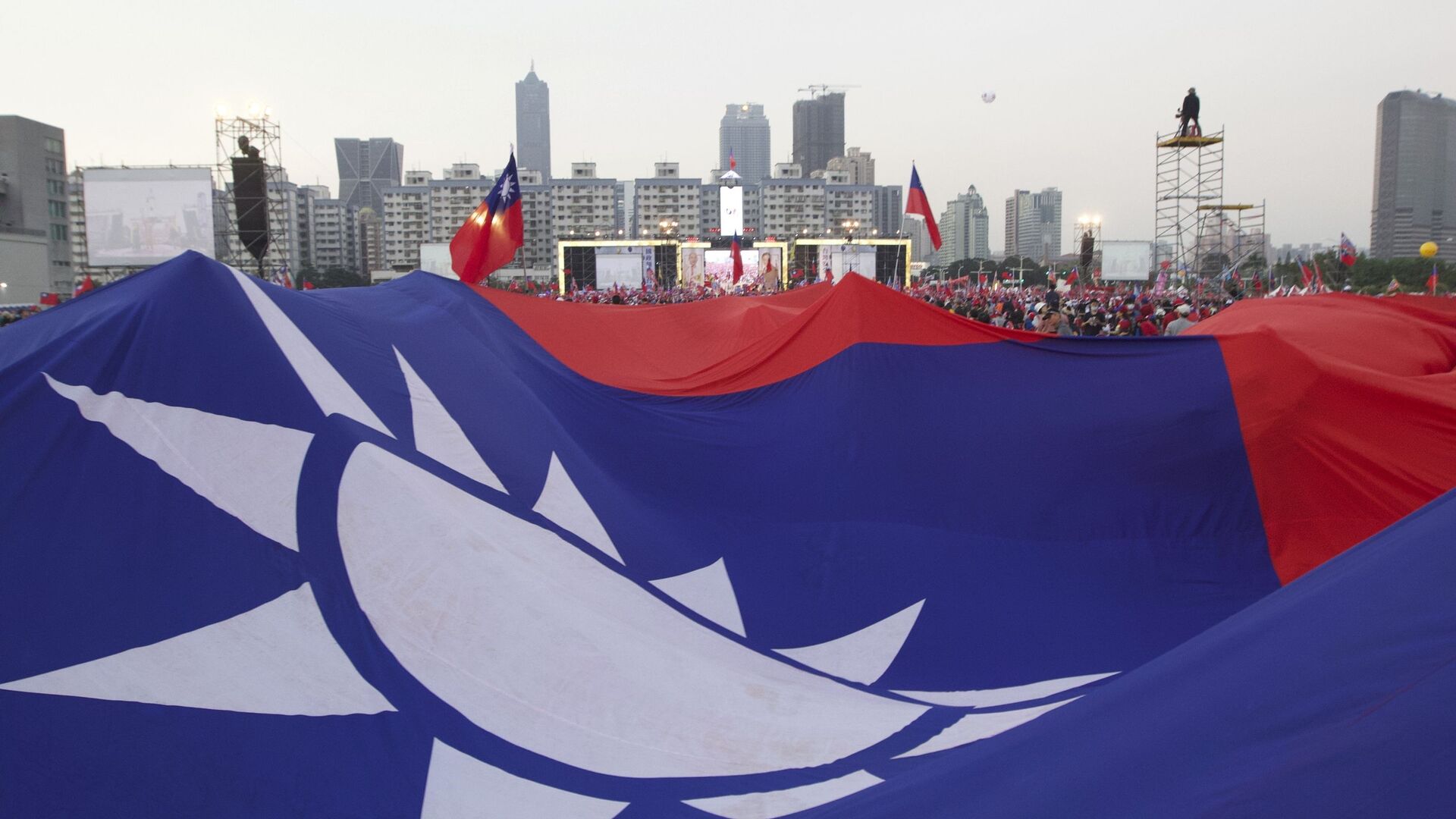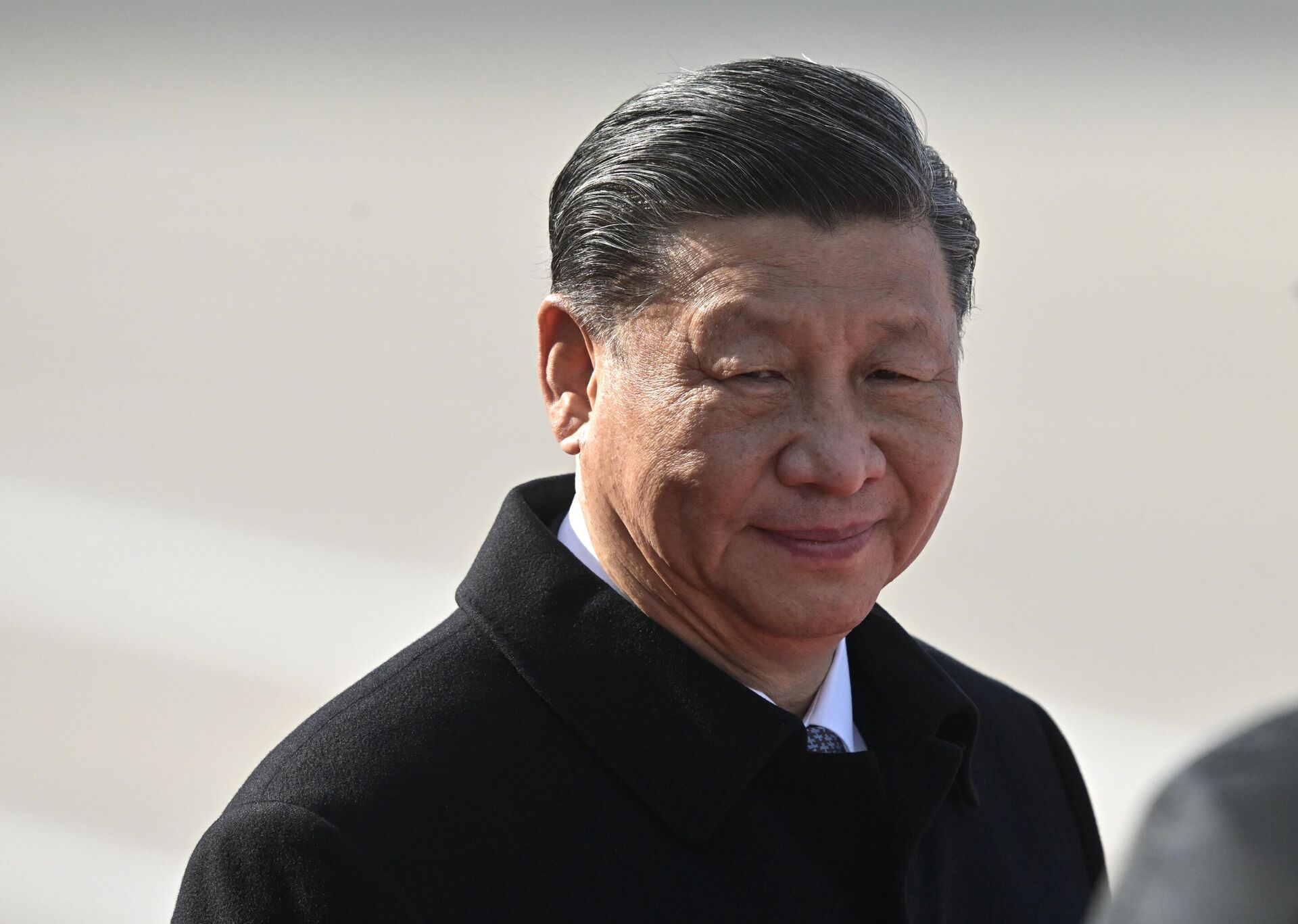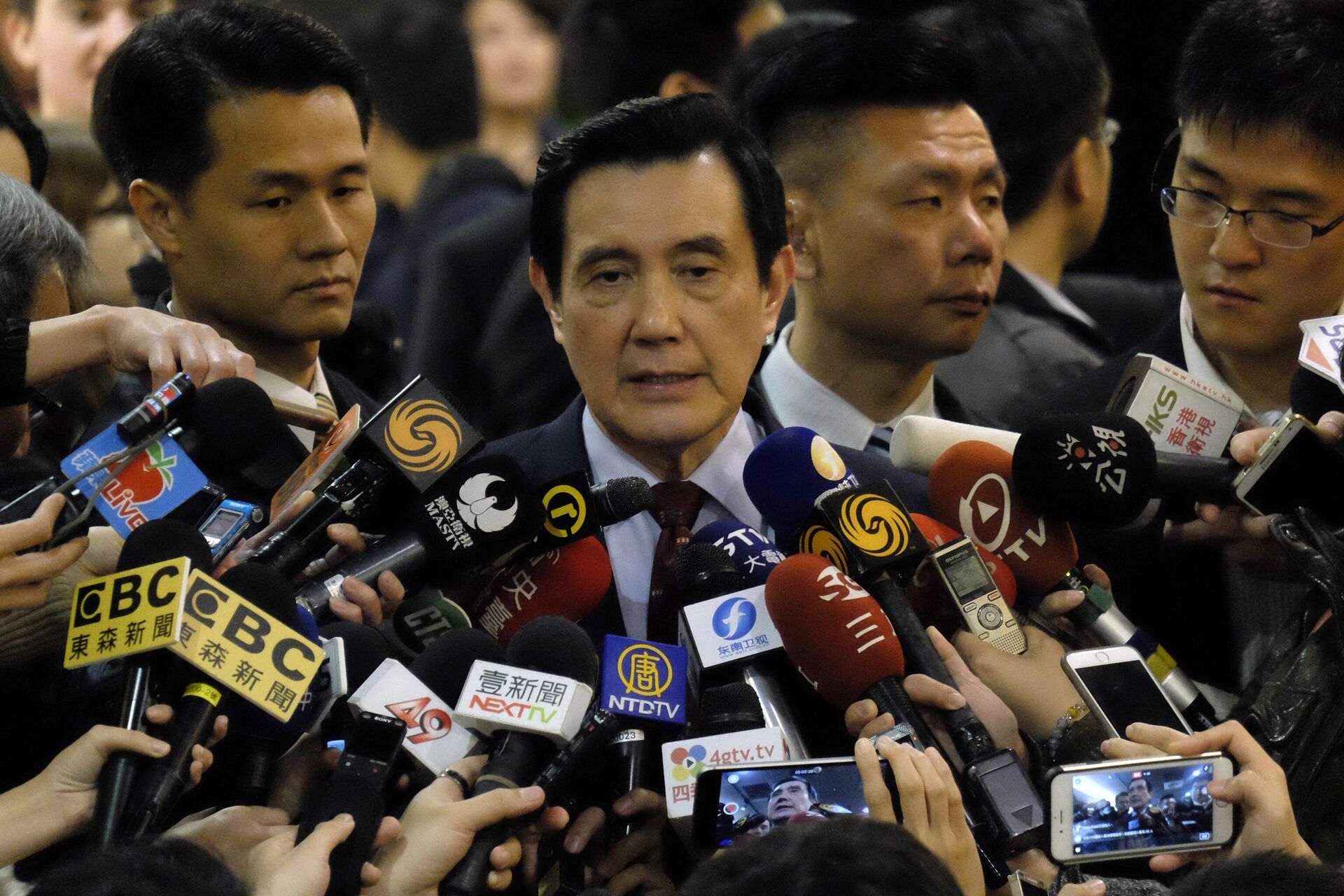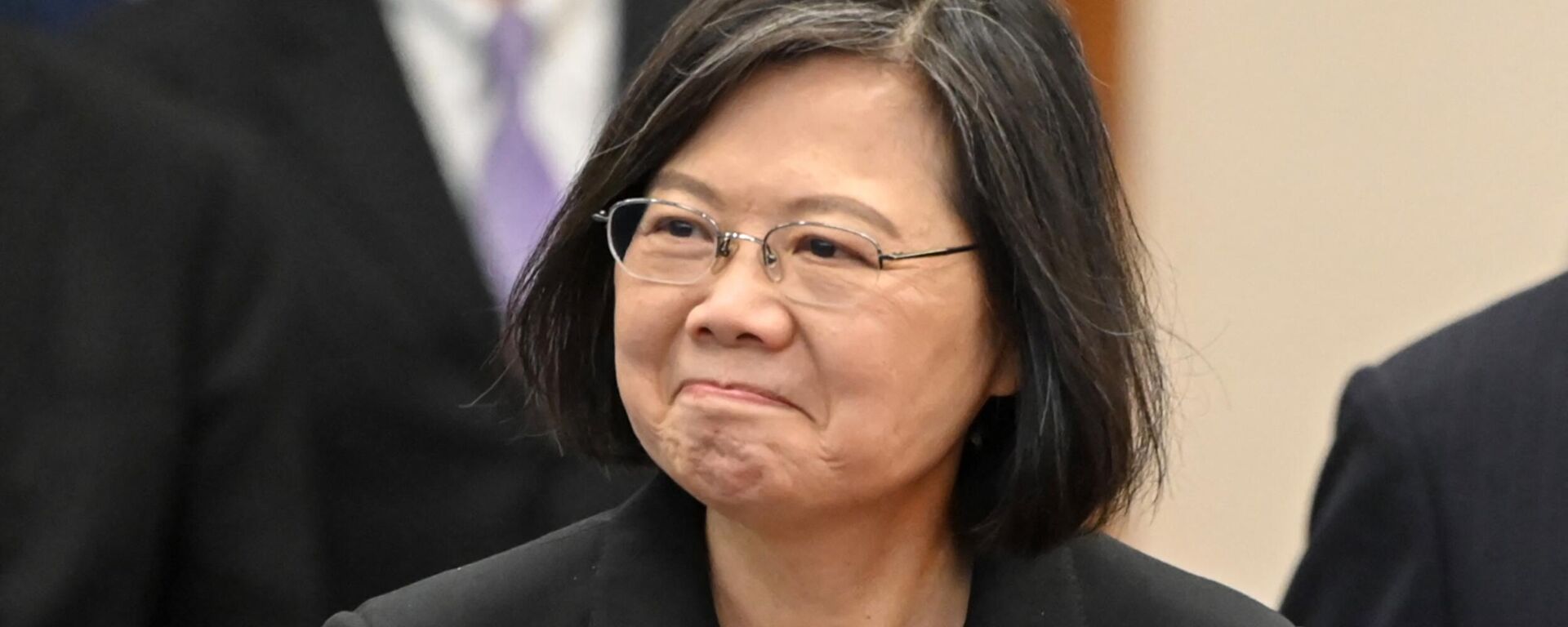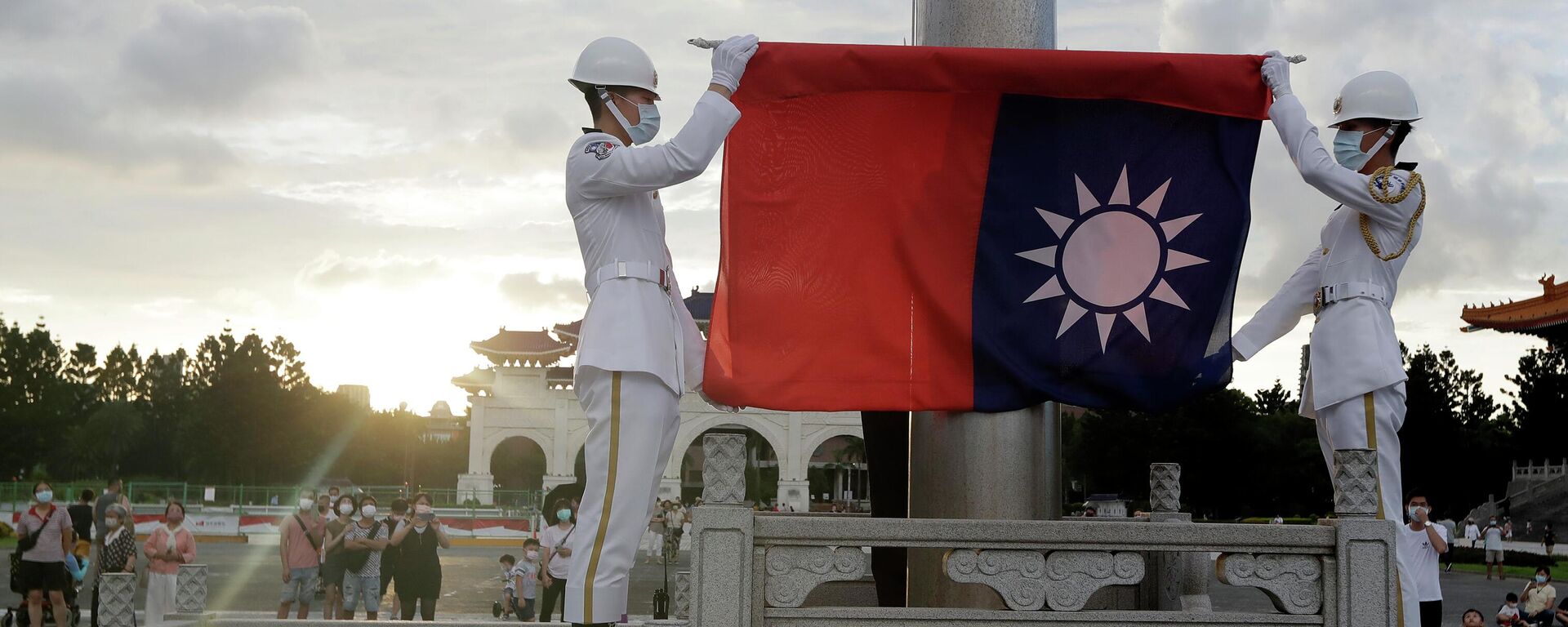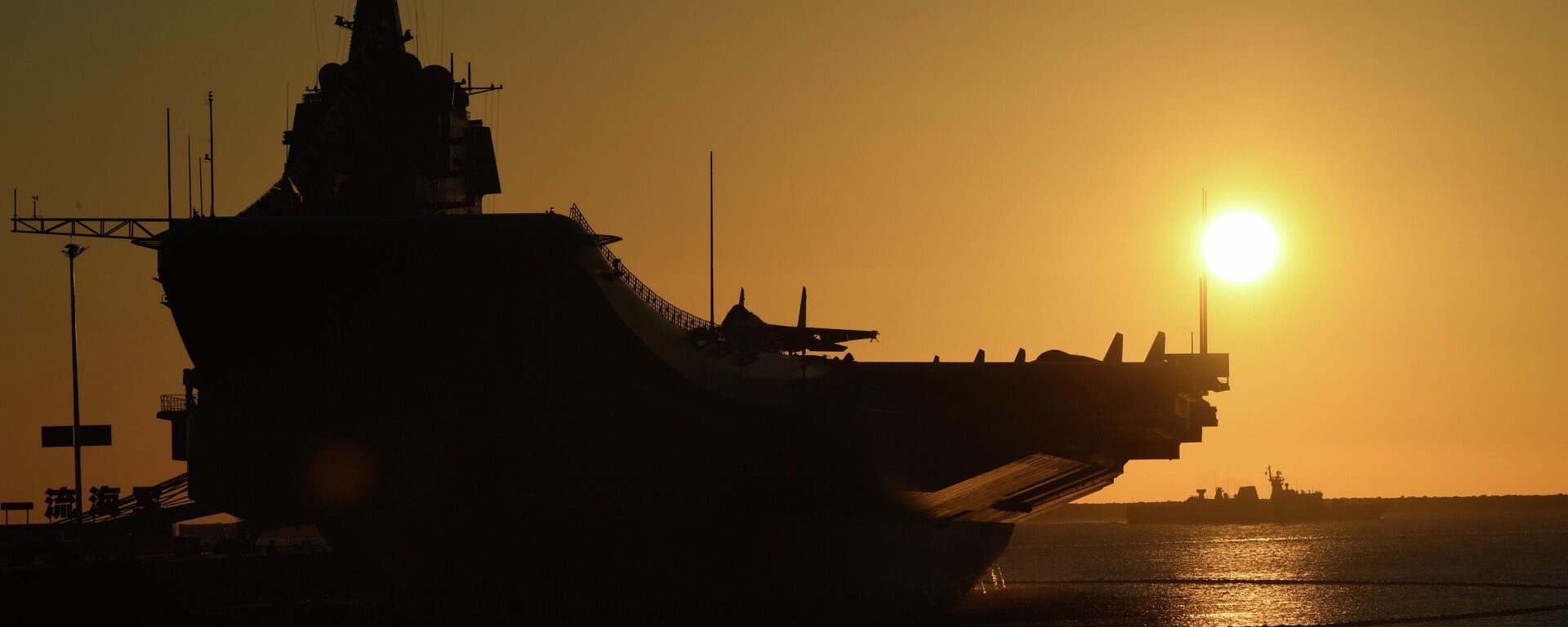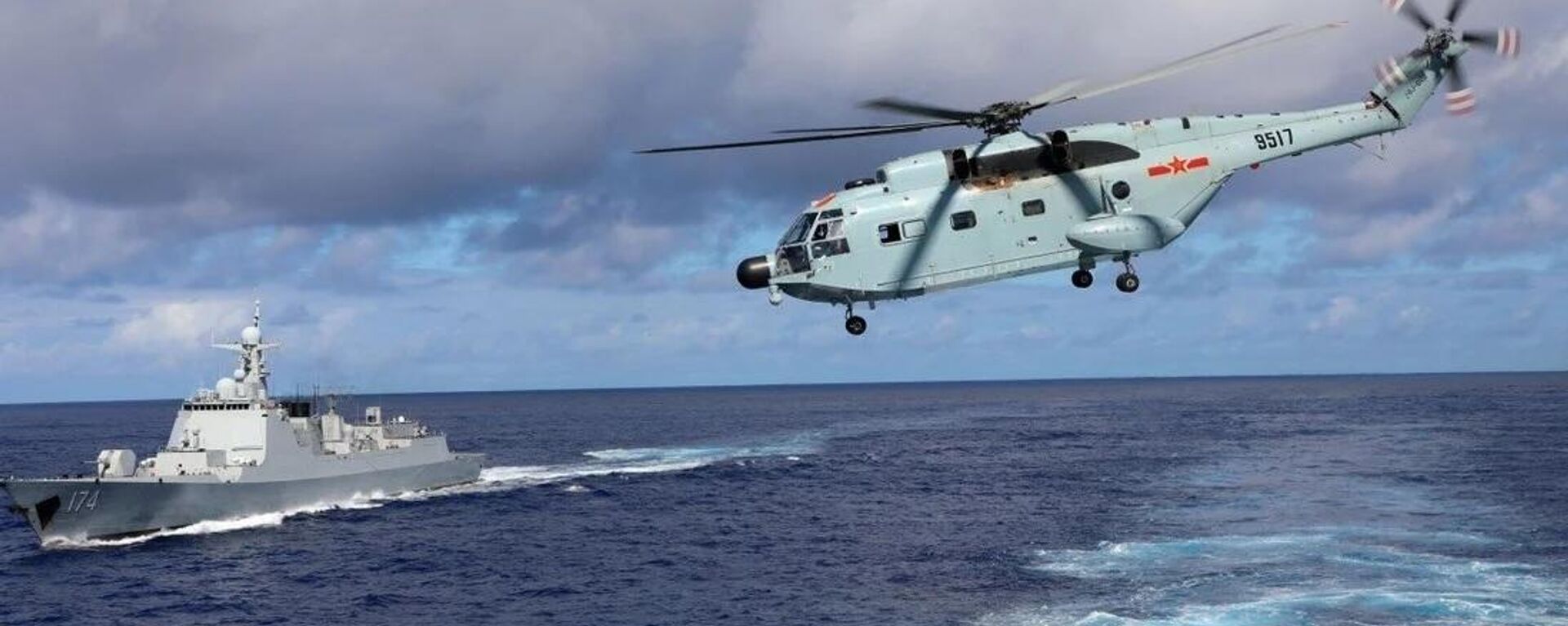https://sputnikglobe.com/20230412/us-speed-up-of-arms-supplies-to-taiwan-prior-to-islands-2024-elections-sends-ominous-signal-1109390632.html
US Speed-Up of Arms Supplies to Taiwan Prior to Island's 2024 Elections Sends Ominous Signal
US Speed-Up of Arms Supplies to Taiwan Prior to Island's 2024 Elections Sends Ominous Signal
Sputnik International
The US is ramping up military aid to Taiwan, justifying the move with the "threat" of China's "invasion" amid soaring political divisions on the island ahead... 12.04.2023, Sputnik International
2023-04-12T14:57+0000
2023-04-12T14:57+0000
2023-06-19T12:46+0000
world
us
china
southeast asia
pivot to asia
indo-asia-pacific region
democratic progressive party (dpp)
kuomintang
communist party of china (cpc)
general elections
https://cdn1.img.sputnikglobe.com/img/07e5/08/0a/1083568873_0:160:3073:1888_1920x0_80_0_0_f1ebaa6189f8a42f23c2a2d3ea7476ec.jpg
US lawmakers have promised Taiwanese leader Tsai Ing-wen to speed up weapons sales to the island while a whopping 25 US defense contractors plan to send representatives to Taiwan in early May to discuss joint production of drones and ammo, according to the Japanese press.On March 28, Defense Secretary Lloyd Austin announced that the Pentagon was going to use a $1 billion authorization to quickly transfer weapons to Taiwan through the Presidential Drawdown Authority. The drawdown authority allows for the speedy delivery of defense assets and services from the Pentagon's stocks to foreign countries and international organizations "to respond to unforeseen emergencies," as per the US State Department's website. The same mechanism has been used by Washington to facilitate the rapid provision of weapons to Ukraine.Late last year, US President Joe Biden signed into law a defense bill which included $10 billion in military aid for Taiwan to bolster the island's defenses against China's potential "invasion." The legislation also authorized the US president to build a "regional contingency stockpile" for the island that includes up to $100 million worth of munitions.The People's Republic of China (PRC) has repeatedly warned Washington policymakers against militarizing Taiwan and fuelling separatist sentiment on the island, which is seen by Beijing as an inalienable part of the People's Republic.Washington's "China Invasion" YarnSo, what's behind Washington's rush to arm Taiwan? The Western mainstream press is fanning the narrative of possible China's "invasion" of the island, citing think tank observers and Taiwanese officials. Some Western analysts went even so far as to predict when exactly the alleged "invasion" could take place: according to them, it might happen no later than in 2026.Meanwhile, Beijing is promoting peaceful re-unification with Taiwan. Moreover, the PRC's new Global Security Initiative, which was released in February 2023, placed emphasis on a peaceful resolution of global conflicts. In late February, Beijing released a 12-point peace plan for Ukraine. In March, China managed to broker a historic peace deal between Iran and Saudi Arabia.China's calculus appears to be clear: the country is seeking to bolster Eurasia's connectivity, shattered by 30-years of US-NATO invasions and occupation of Afghanistan, Iraq, and Syria, and the militarization of Europe and Southeast Asia.Furthermore, direct involvement in any military conflict in Southeast Asia could disrupt Beijing's ambitious Belt and Road Initiative, some international observers say. Others cite Sun Tzu, a famous Chinese military strategist, who said: "To subdue the enemy without fighting is the acme of skill"; according to them, the epitome of China's strategy is gaining victory through non-military means.'One Country, Two Systems'Beijing has maintained its plan for peaceful reunification with Taiwan since the 1950s. The nation became divided following the Civil War of 1949, when Chinese nationalists led by the Kuomintang (KMT) were defeated by the Communist Party of China (CPC) and fled to Taiwan.Under Xi Jinping, who assumed the position of chairman of the Central Military Commission in 2012, the Chinese government adopted a set of measures to facilitate re-unification with the island. Under then-Taiwan leader Ma Ying-jeou (the KMT), who governed the island between 2008 and 2016, Taiwan signed 23 treaties on cross-strait trade with China, opened direct flights, schools, and facilitated business exchanges.Starting from 2016, Taiwanese leader Tsai Ing-wen adopted a strategy of provoking Beijing, apparently encouraged by Washington. Even though the US recognized the PRC in 1979 and severed official diplomatic ties with Taiwan in accordance with the "One China" principle, it continued to maintain informal relations with the island.On December 2, 2016, then-US President-elect Donald Trump held a phone conversation with Tsai, causing a storm of criticism from Beijing. The Trump administration then deepened ties with Taiwan, while his successor, Joe Biden, even went so far as to repeatedly pledge to protect the island militarily against Beijing.The number of high-profile summits between US and Taiwanese officials has also increased under the Biden administration, including then-House Speaker Nancy Pelosi's visit to Taipei in August 2022 and incumbent House Speaker Kevin McCarthy's meeting with Tsai in Los Angeles in April. In both cases, China responded with large-scale naval drills, accusing Washington of fuelling Taiwan secessionism, abusing the PRC's sovereignty and integrity.January 2024 Election & KMT's RiseStill, the forthcoming January 2024 presidential elections may end badly for Tsai, given that Taiwan's economy is slowing down, and the island's nine diplomatic allies have switched sides and turned to Beijing under her watch, as Dr. Chang Ching, senior research fellow of the Taiwan-based Society for Strategic Studies, noted in an interview with Sputnik on March 30.For its part, the KMT is apparently seeking to mend fences with China in order to present itself as a force capable of ensuring stability and maintaining working relations with great power actors.Addressing his supporters in early January, former Taiwanese leader Ma Ying-jeou highlighted that the forthcoming 2024 presidential and legislative elections offer a choice between war and peace: “Vote for the KMT, and there will be no battlefield across the Taiwan Strait," the former Taiwanese leader vowed.For his part, KMT Vice Chairman Andrew Hsia Li-yan paid a series of high-profile visits to China, one of which came immediately after then-House Speaker Pelosi's scandalous visit to the island in August 2022.In February 2023, Hsia met with Wang Huning, a member of the CCP Central Committee’s Politburo Standing Committee, and Song Tao, head of China’s Taiwan Affairs Office. The KMT vice chairman signaled commitment to the 1992 consensus, adding that "maintaining the peace and stability of cross-strait relations (…) have always been the KMT’s highest priority policy goal."Between March 27 and April 7, former Taiwanese leader Ma Ying-jeou paid an unprecedented visit to the mainland China, which coincided with Tsai's provocative "transit" trip to the US. Speaking in front of the Sun Yat-sen mausoleum in Nanjing, Ma stated that "people on both sides of the Taiwan strait are Chinese people."According to international observers, the KMT has a good chance of winning the 2024 election. The party did well during the November 2022 “9-in-1” elections, and won 13 of the top political posts in local governments across 22 cities, counties, and municipalities, while the DPP won only five.The US and its allies appear deeply concerned by the possibility of a KMT victory. House Foreign Affairs Committee Chairman Rep. Michael McCaul (R-Texas) warned on April 9 that China could "take over" Taiwan in the next election "without a shot fired" and accused Beijing of trying to influence the Taiwanese election.The Western mainstream media has also raised the alarm over the KMT's "threat" to the island's "independence." According to the press, the KMT promises "prosperity and peace," while the DPP should sell a harder message that Taiwanese should make sacrifices and "prepare for war." The media lamented the fact that the DPP has been hesitant to promote the war message and referred to the Taiwan Public Opinion Foundation January report which claimed that 72.7% of Taiwanese respondents backed extending conscription.US May Step Up Provocations Prior to 2024 ElectionsGiven that the January 2024 Taiwanese elections could tip the balance in favor of the KMT, there is no need for Beijing to aggravate tensions with the island, international observers say. In contrast, it's Washington who poised to lose the most if the "1992 Consensus" group wins: the KMT victory could bring an end to the US' Taiwan provocations and strip Washington of the leverage against Beijing.In light of this, the US appears to be interested in bolstering provocations over Taiwan to mar Beijing's international image by depicting it as an "aggressor" prior to the 2024 elections, some observers assume. Simultaneously, the US is likely to increase the funding of Taiwanese youth parties, think tanks, and NGOs advocating for the island's independence from the PRC. US-orchestrated military provocations cannot also be ruled out, Russian analysts warn, referring to Washington's Ukraine playbook.On April 8-10, the Chinese conducted large-scale military drills around the island in response to Tsai's meetings with high-profile officials in the US to send a warning signal to Taiwanese separatists and their backers. The drills simulated the encirclement of the island and blocking potential incursions by external forces, such as the US and Japan. According to the Chinese media, the People's Liberation Army continued on April 11 routine patrols and exercises around the island despite the conclusion of its combat alert patrols and Joint Sword drills.Between now and January 2024, one may expect that the US will try to raise the stakes in order to upend the established status quo, with speeded-up delivery of US weapons to Taiwan sending an ominous signal to the region.
https://sputnikglobe.com/20230222/how-russo-chinese-strategic-cooperation-may-bring-us-forever-wars-to-end-1107713826.html
https://sputnikglobe.com/20230330/tsais-strategy-of-provoking-beijing-backfiring-on-taiwan-as-it-keeps-losing-allies--1108967041.html
https://sputnikglobe.com/20230406/taiwan-ex-leaders-historic-visit-to-china-ahead-of-tsais-us-trip-exposes-political-divisions-1109210204.html
https://sputnikglobe.com/20220817/china-believes-biden-authorized-pelosis-visit-to-taiwan-ambassador-says-1099685150.html
https://sputnikglobe.com/20230411/shandong-aircraft-carrier-group-hosts-j-15-fighter-sorties-on-final-day-of-pla-drills-near-taiwan-1109344783.html
https://sputnikglobe.com/20230410/kremlin-on-chinas-military-drills-beijing-has-right-to-react-to-provocative-actions-1109315401.html
china
southeast asia
indo-asia-pacific region
taiwan
Sputnik International
feedback@sputniknews.com
+74956456601
MIA „Rossiya Segodnya“
2023
News
en_EN
Sputnik International
feedback@sputniknews.com
+74956456601
MIA „Rossiya Segodnya“
Sputnik International
feedback@sputniknews.com
+74956456601
MIA „Rossiya Segodnya“
china taiwan reunification, one country two systems, one china policy, tsai ing-wen transit trip, 2024 taiwanese elections, the kuomintang, us weapons to taiwan, us speeding up weapons deliveries to taiwan, chinese military drills around taiwan, tsai's meeting with house speaker mccarthy, taiwan strait, provocations taiwan strait
china taiwan reunification, one country two systems, one china policy, tsai ing-wen transit trip, 2024 taiwanese elections, the kuomintang, us weapons to taiwan, us speeding up weapons deliveries to taiwan, chinese military drills around taiwan, tsai's meeting with house speaker mccarthy, taiwan strait, provocations taiwan strait
US Speed-Up of Arms Supplies to Taiwan Prior to Island's 2024 Elections Sends Ominous Signal
14:57 GMT 12.04.2023 (Updated: 12:46 GMT 19.06.2023) The US is ramping up military aid to Taiwan, justifying the move with the "threat" of China's "invasion" amid soaring political divisions on the island ahead of the January 2024 presidential elections, which may potentially see a Kuomintang comeback.
US lawmakers have promised Taiwanese leader Tsai Ing-wen to speed up weapons sales to the island while a whopping 25 US defense contractors plan to send representatives to Taiwan in early May to discuss joint production of drones and ammo, according to the Japanese press.
On March 28, Defense Secretary Lloyd Austin announced that the Pentagon was going to use a $1 billion authorization to quickly transfer weapons to Taiwan through the Presidential Drawdown Authority. The drawdown authority allows for the speedy delivery of defense assets and services from the Pentagon's stocks to foreign countries and international organizations "to respond to unforeseen emergencies," as per the US State Department's website. The same mechanism has been used by Washington to facilitate the rapid provision of weapons to Ukraine.
In early March, the US State Department greenlighted the $619 million sale of hundreds of missiles to Taiwan to arm 66 F-16V jet fighters that the island is slated to receive by the end of 2026. All in all, Washington has approved of more than $20 billion in sales of military equipment to Taiwan since 2019, including Harpoon anti-ship missiles and Sidewinder missiles for warplanes, hundreds of Javelin anti-tank weapons, surface-to-air Stinger missiles, howitzers, and other munitions.
Late last year, US President Joe Biden signed into law a defense bill which included $10 billion in military aid for Taiwan to bolster the island's defenses against China's potential "invasion." The legislation also authorized the US president to build a "regional contingency stockpile" for the island that includes up to $100 million worth of munitions.
The People's Republic of China (PRC) has repeatedly warned Washington policymakers against militarizing Taiwan and fuelling separatist sentiment on the island, which is seen by Beijing as an inalienable part of the People's Republic.
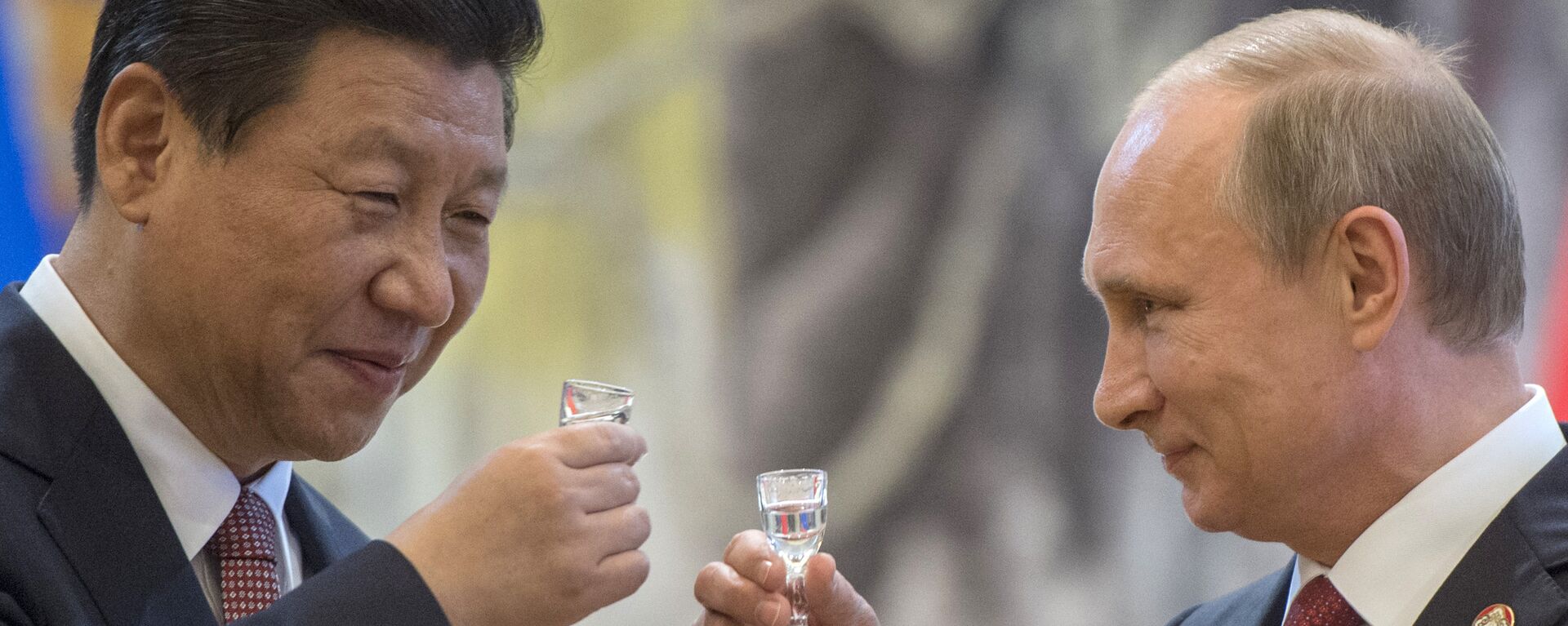
22 February 2023, 17:29 GMT
Washington's "China Invasion" Yarn
So, what's behind Washington's rush to arm Taiwan? The Western mainstream press is fanning the narrative of possible China's "invasion" of the island, citing think tank observers and Taiwanese officials. Some Western analysts went even so far as to predict when exactly the alleged "invasion" could take place: according to them, it might happen no later than in 2026.
The Center for Strategic and International Studies (CSIS), a Washington, DC think tank, even conducted war game simulations of a "possible Chinese invasion of Taiwan in 2026" in January 2023. Acknowledging that Chinese plans are actually "unclear," the think tank nonetheless insisted that an "invasion" cannot be ruled out. For his part Taiwan's Foreign Minister Joseph Wu told the British press that Beijing is "likely to invade" the island in 2027.
Meanwhile, Beijing is promoting peaceful re-unification with Taiwan. Moreover, the PRC's new Global Security Initiative, which was released in February 2023, placed emphasis on a peaceful resolution of global conflicts. In late February, Beijing released a 12-point peace plan for Ukraine. In March, China managed to broker a historic peace deal between Iran and Saudi Arabia.
China's calculus appears to be clear: the country is seeking to bolster Eurasia's connectivity, shattered by 30-years of US-NATO invasions and occupation of Afghanistan, Iraq, and Syria, and the militarization of Europe and Southeast Asia.
Furthermore, direct involvement in any military conflict in Southeast Asia could disrupt Beijing's ambitious Belt and Road Initiative, some international observers say. Others cite Sun Tzu, a famous Chinese military strategist, who said: "To subdue the enemy without fighting is the acme of skill"; according to them, the epitome of China's strategy is gaining victory through non-military means.
'One Country, Two Systems'
Beijing has maintained its plan for peaceful reunification with Taiwan since the 1950s. The nation became divided following the Civil War of 1949, when Chinese nationalists led by the Kuomintang (KMT) were defeated by the Communist Party of China (CPC) and fled to Taiwan.
In January, 1979, Chinese leader Deng Xiaoping came up with the concept of "one country, two systems" and stated that "so long as Taiwan returns to the embrace of the motherland, we will respect the realities and the existing system there." The principle was first applied in resolving the questions of Hong Kong and Macao. In 1992, the KMT and the CCP reached a consensus, saying that there's "one China with different interpretations."
Under Xi Jinping, who assumed the position of chairman of the Central Military Commission in 2012, the Chinese government adopted a set of measures to facilitate re-unification with the island. Under then-Taiwan leader Ma Ying-jeou (the KMT), who governed the island between 2008 and 2016, Taiwan signed 23 treaties on cross-strait trade with China, opened direct flights, schools, and facilitated business exchanges.
Still, after the Democratic Progressive Party (DPP) gained the presidency and legislative majority in 2016, the island's relations with the mainland started to deteriorate. The DPP refused to acknowledge the "1992 Consensus," which resulted in the suspension of cross-strait exchanges.
Starting from 2016, Taiwanese leader
Tsai Ing-wen adopted a strategy of provoking Beijing, apparently encouraged by Washington. Even though the US recognized the PRC in 1979 and severed official diplomatic ties with Taiwan in accordance with the "One China" principle, it continued to maintain informal relations with the island.
On December 2, 2016, then-US President-elect Donald Trump held a phone conversation with Tsai, causing a storm of criticism from Beijing. The Trump administration then deepened ties with Taiwan, while his successor, Joe Biden, even went so far as to repeatedly pledge to protect the island militarily against Beijing.
The number of high-profile summits between US and Taiwanese officials has also increased under the Biden administration, including then-House Speaker Nancy Pelosi's visit to Taipei in August 2022 and incumbent House Speaker Kevin McCarthy's meeting with Tsai in Los Angeles in April. In both cases, China responded with large-scale naval drills, accusing Washington of fuelling Taiwan secessionism, abusing the PRC's sovereignty and integrity.
January 2024 Election & KMT's Rise
Still, the forthcoming January 2024 presidential elections may end badly for Tsai, given that Taiwan's economy is slowing down, and
the island's nine diplomatic allies have switched sides and turned to Beijing under her watch, as Dr. Chang Ching, senior research fellow of the Taiwan-based Society for Strategic Studies, noted in an interview with Sputnik on March 30.
For its part, the KMT is apparently seeking to mend fences with China in order to present itself as a force capable of ensuring stability and maintaining working relations with great power actors.
Addressing his supporters in early January, former Taiwanese leader Ma Ying-jeou highlighted that the forthcoming 2024 presidential and legislative elections offer a choice between war and peace: “Vote for the KMT, and there will be no battlefield across the Taiwan Strait," the former Taiwanese leader vowed.
For his part, KMT Vice Chairman Andrew Hsia Li-yan paid a series of high-profile visits to China, one of which came immediately after then-House Speaker Pelosi's scandalous visit to the island in August 2022.
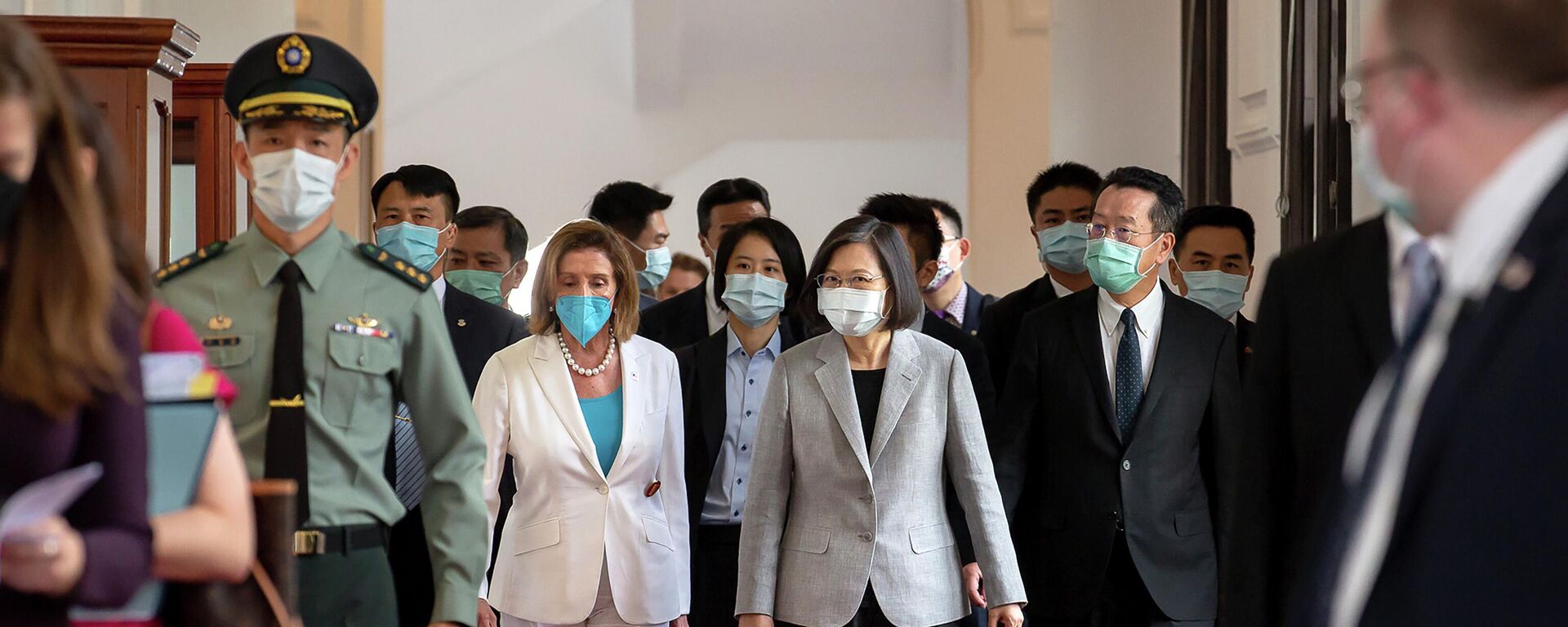
17 August 2022, 07:52 GMT
In February 2023, Hsia met with Wang Huning, a member of the CCP Central Committee’s Politburo Standing Committee, and Song Tao, head of China’s Taiwan Affairs Office. The KMT vice chairman signaled commitment to the 1992 consensus, adding that "maintaining the peace and stability of cross-strait relations (…) have always been the KMT’s highest priority policy goal."
Between March 27 and April 7, former Taiwanese leader Ma Ying-jeou paid an unprecedented visit to the mainland China, which coincided with Tsai's provocative "transit" trip to the US. Speaking in front of the Sun Yat-sen mausoleum in Nanjing, Ma stated that "people on both sides of the Taiwan strait are Chinese people."
According to international observers, the KMT has a good chance of winning the 2024 election. The party did well during the November 2022 “9-in-1” elections, and won 13 of the top political posts in local governments across 22 cities, counties, and municipalities, while the DPP won only five.
The US and its allies appear deeply concerned by the possibility of a KMT victory. House Foreign Affairs Committee Chairman Rep. Michael McCaul (R-Texas) warned on April 9 that China could "take over" Taiwan in the next election "without a shot fired" and accused Beijing of trying to influence the Taiwanese election.
The Western mainstream media has also raised the alarm over the KMT's "threat" to the island's "independence." According to the press, the KMT promises "prosperity and peace," while the DPP should sell a harder message that Taiwanese should make sacrifices and "prepare for war." The media lamented the fact that the DPP has been hesitant to promote the war message and referred to the Taiwan Public Opinion Foundation January report which claimed that 72.7% of Taiwanese respondents backed extending conscription.
One should bear in mind that ordinary Taiwanese do not want to fight in a hypothetical war with China, Thomas W. Pauken II, the author of "US vs China: From Trade War to Reciprocal Deal" and consultant on Asia-Pacific affairs, told Sputnik in late February. If Washington war planners believe that they can arm the Taiwanese in order to send them to fight against the Chinese, it means they are getting the regional situation wrong, according to the author. Pauken noted that Washington's proxy war in Ukraine, in which Ukrainian troops are being used as cannon fodder, unnerves the Taiwanese.
US May Step Up Provocations Prior to 2024 Elections
Given that the January 2024 Taiwanese elections could tip the balance in favor of the KMT, there is no need for Beijing to aggravate tensions with the island, international observers say. In contrast, it's Washington who poised to lose the most if the "1992 Consensus" group wins: the KMT victory could bring an end to the US' Taiwan provocations and strip Washington of the leverage against Beijing.
In light of this, the US appears to be interested in bolstering provocations over Taiwan to mar Beijing's international image by depicting it as an "aggressor" prior to the 2024 elections, some observers assume. Simultaneously, the US is likely to increase the funding of Taiwanese youth parties, think tanks, and NGOs advocating for the island's independence from the PRC. US-orchestrated military provocations cannot also be ruled out, Russian analysts warn, referring to Washington's Ukraine playbook.
On April 8-10, the Chinese conducted large-scale military drills around the island in response to Tsai's meetings with high-profile officials in the US to send a warning signal to Taiwanese separatists and their backers. The drills simulated the encirclement of the island and blocking potential incursions by external forces, such as the US and Japan. According to the Chinese media, the People's Liberation Army continued on April 11 routine patrols and exercises around the island despite the conclusion of its combat alert patrols and Joint Sword drills.
Between now and January 2024, one may expect that the US will try to raise the stakes in order to upend the established status quo, with speeded-up delivery of US weapons to Taiwan sending an ominous signal to the region.
